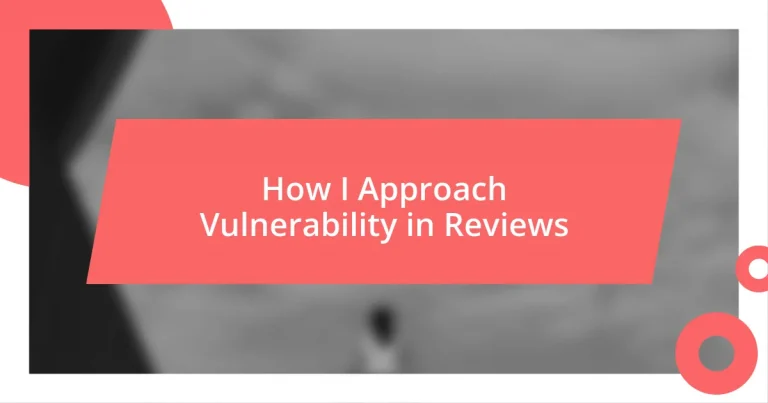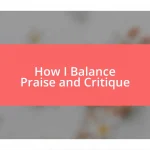Key takeaways:
- Embracing vulnerability in reviews fosters deeper connections and creates a safe space for open dialogue, allowing readers to relate more authentically.
- Authentic communication techniques like empathetic listening, storytelling, and sharing specific details enhance relatability and build trust in the reviews.
- Balancing honesty with sensitivity promotes constructive feedback; it encourages growth and shared understanding among reviewers and their audience.
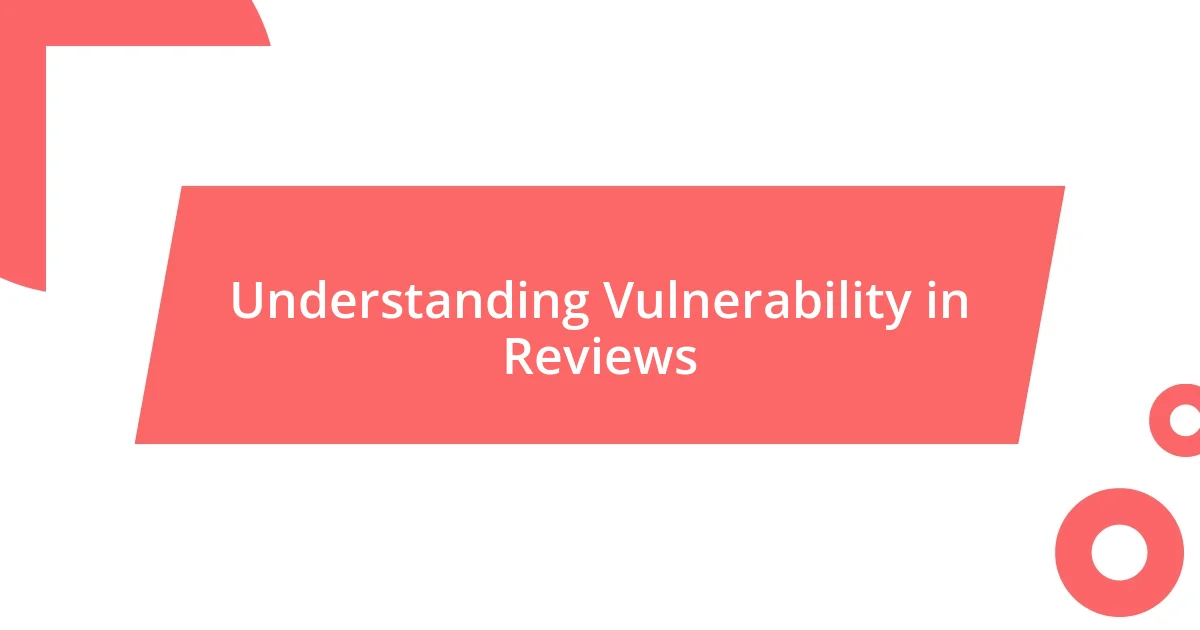
Understanding Vulnerability in Reviews
Vulnerability in reviews is all about transparency—it’s about laying bare our thoughts and feelings without a filter. I remember the first time I shared a candid review of an experience that left me feeling disappointed. It felt risky, but the responses I received showed me that others appreciated my honesty. Have you ever noticed how your honest opinions can resonate more powerfully with others than polished critiques?
When we embrace vulnerability, we invite readers to connect on a deeper level. I once tackled a product review where I shared not just the features but also the emotional impact it had on me during a tough time. It transformed the review into something more relatable, sparking conversations that felt meaningful. Isn’t it fascinating how our personal stories can illuminate even the simplest of reviews?
Acknowledging vulnerabilities in reviews isn’t just beneficial for us—it creates a safe space for others to share their experiences. I’ve learned that reading a review where the author admits to their struggles or uncertainties opens the door for a dialogue that can be incredibly enlightening. What would happen if we all approached our reviews with that same level of honesty?
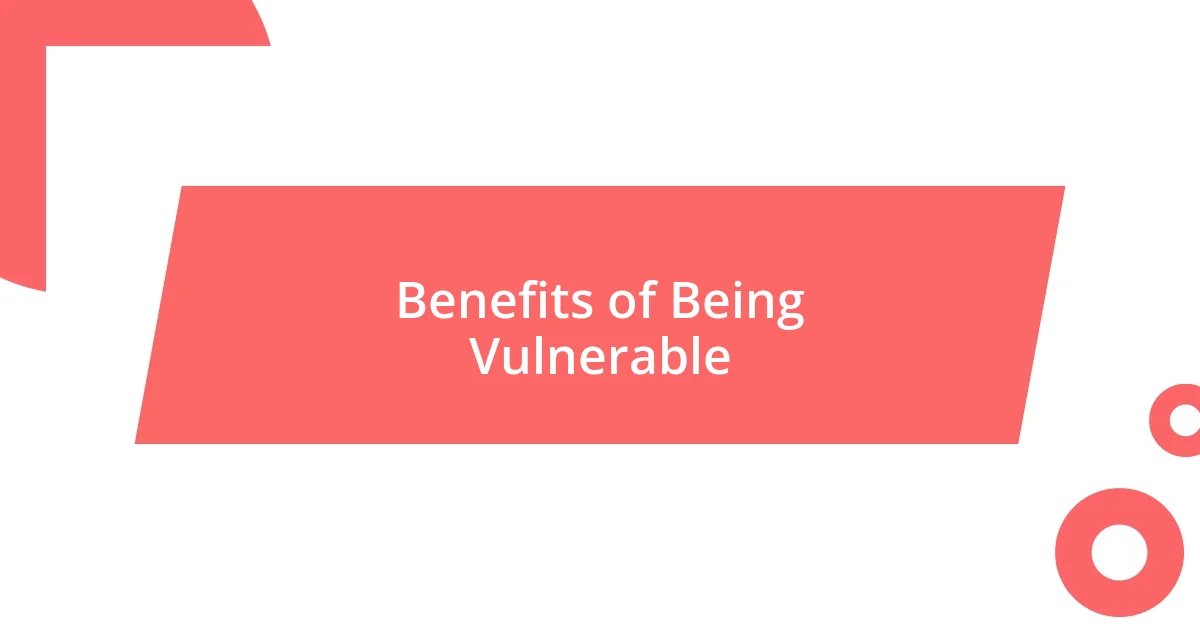
Benefits of Being Vulnerable
Being vulnerable in reviews fosters authentic connections. I recall a moment when I opened up about a product that didn’t live up to its promise, admitting how frustrated I felt as someone who had high hopes. This honesty didn’t just help me process my emotions; it resonated with others who had similar experiences, creating a sense of solidarity among us. It’s incredible how sharing our truths can bring people together, isn’t it?
Here are some benefits of being vulnerable in reviews:
– Builds Trust: Readers appreciate honesty and are more likely to trust your opinions when you share your genuine feelings.
– Encourages Open Dialogue: Vulnerability invites others to share their experiences, leading to enriching conversations.
– Facilitates Personal Growth: By expressing your honest opinions, you gain a better understanding of your preferences and values.
– Promotes Empathy: Sharing challenges can help readers feel understood, fostering empathy and connection.
– Enhances Relatability: Candidness in reviews makes your experiences relatable, encouraging others to engage with your perspective.
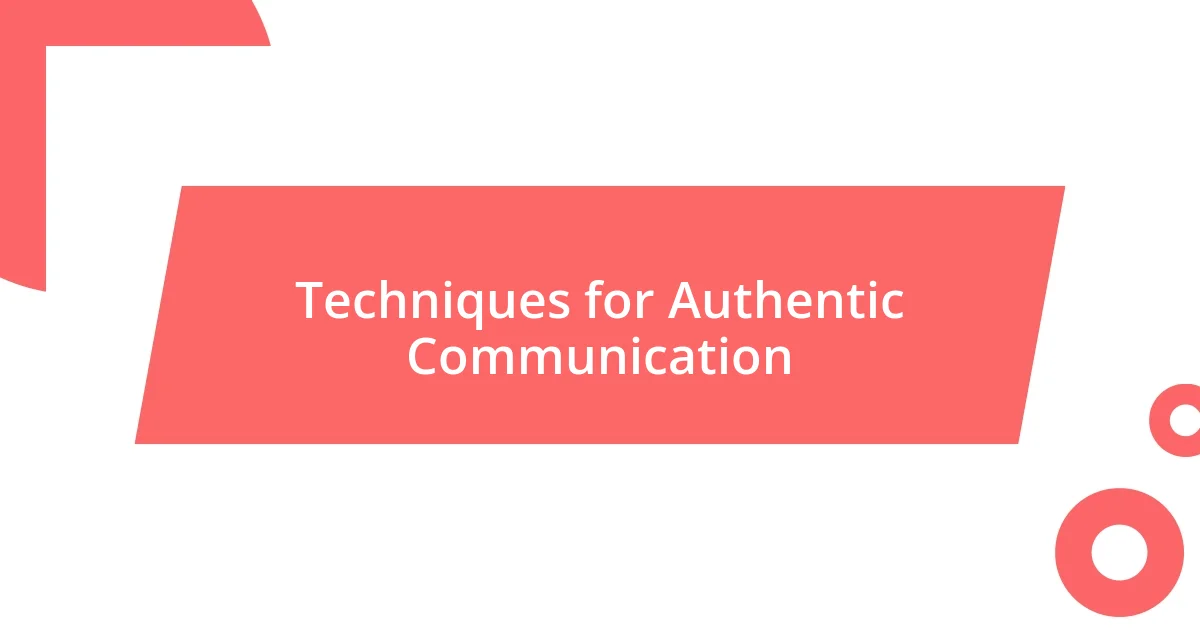
Techniques for Authentic Communication
To achieve authentic communication in reviews, actively practicing empathetic listening is crucial. I once read a review where the author posed thoughtful questions, prompting me to reflect on my own experiences. I felt seen and appreciated, as if the writer truly cared about connecting rather than just sharing a product summary. Have you ever felt like someone was speaking directly to you through their words?
Another technique is to use storytelling. I vividly remember crafting a review for a kitchen appliance that transformed my cooking experience. I shared an anecdote about a dinner party gone wrong, where the product came to my rescue and saved the day. These relatable narratives not only capture attention but also make the content more memorable and impactful. Isn’t it interesting how a simple story can make a review leap off the page, engaging readers on a personal level?
Lastly, vulnerability shines through when we incorporate specific details. I recall sharing my hesitations about trying a new skincare product, detailing my skin sensitivities, and the nervousness I felt. Being specific invites readers to empathize, as they can visualize my insecurities and struggles. This level of detail cultivates a genuine connection, encouraging readers to trust and relate to my experience on a deeper level.
| Technique | Description |
|---|---|
| Empathetic Listening | Engaging readers with questions and reflective prompts to foster deeper connections. |
| Storytelling | Using personal anecdotes to illustrate experiences, making reviews relatable and memorable. |
| Specific Details | Sharing unique insights and nuances to enhance authenticity and build trust. |
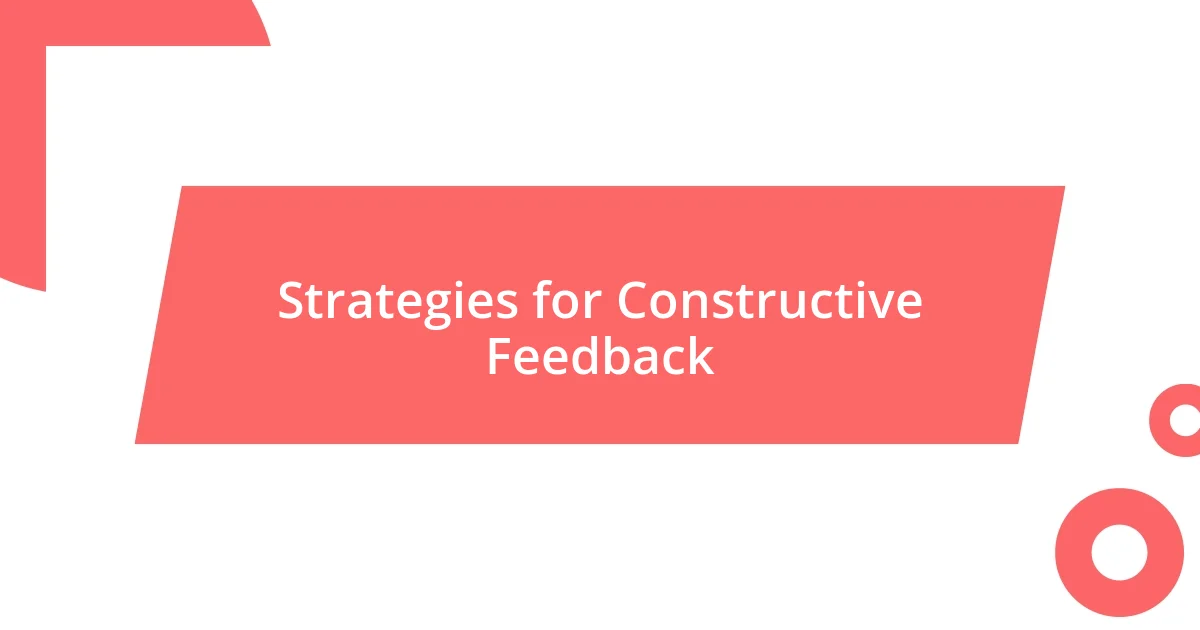
Strategies for Constructive Feedback
When I think about giving constructive feedback, I often remind myself that tone matters greatly. I remember a time I reviewed a book that didn’t quite meet my expectations. Instead of just pointing out the flaws, I framed my critique as an opportunity for the author to grow, saying something like, “While I struggled with the pacing, I think your characters have so much potential.” This approach invites improvement rather than discouragement, wouldn’t you agree?
Another effective strategy involves balancing praise with criticism. Once, I reviewed a restaurant where I loved the ambiance but felt the service fell short. I shared, “The decor transported me to another world, but I left longing for a more attentive experience.” This dual approach not only acknowledges strengths but also guides potential improvements. Isn’t it fascinating how highlighting both sides can create a more balanced conversation?
Lastly, I find it compelling to ask for feedback in return. During a review of a travel destination, I mentioned my hesitations about certain activities but added, “I’d love to hear if anyone else had a different experience!” This opens the door to dialogue. It makes readers feel their opinions are valued and creates a community of shared experiences. Have you ever noticed how those conversations enrich our understanding?
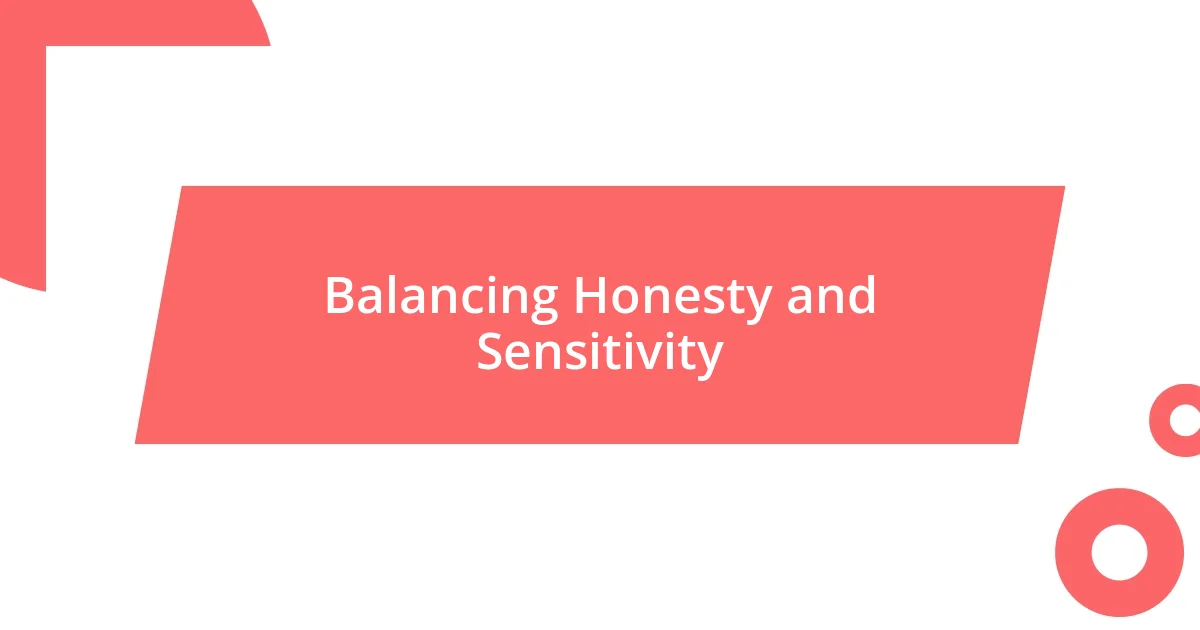
Balancing Honesty and Sensitivity
Balancing honesty with sensitivity in reviews can be a delicate dance. I remember writing a review for a highly anticipated movie that didn’t quite live up to the hype. Instead of just slamming it, I chose to highlight the aspects that worked, saying, “While the visuals were stunning, the plot felt disjointed, leaving me disconnected.” This way, I expressed my disappointment without souring the experience for others. How do you navigate such tricky waters?
It’s vital to consider how my words can affect others when sharing my thoughts. I once critiqued a local café known for its unique ambiance but poor service. I chose to frame my feedback by saying, “The atmosphere felt like a warm hug, but the service left me reaching for patience.” This approach softened the blow while still conveying my experience, encouraging the owners to improve. Do you think that honesty can coexist with kindness?
I find that vulnerability and empathy intersect beautifully in reviews. When I talked about my struggles with a certain fitness program, I openly shared my initial doubts and fears, which made my eventual successes feel more authentic. By narrating, “I was terrified to step into the gym, but the supportive community changed everything for me,” I connected deeper with readers facing similar challenges. Have you ever noticed how sharing our vulnerabilities can forge stronger connections?
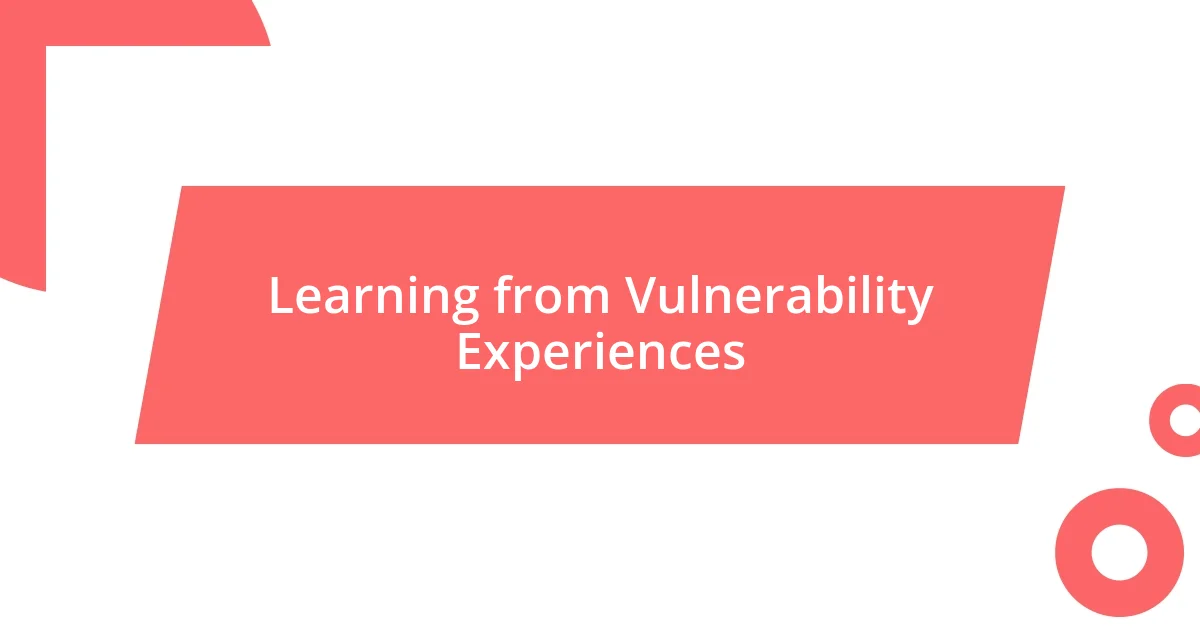
Learning from Vulnerability Experiences
Reflecting on my own experiences with vulnerability, I’ve come to realize how revealing my true feelings can enrich both my reviews and my relationships with my audience. For instance, when I wrote about my struggle with a popular book that left me bewildered, I didn’t shy away from saying, “I felt lost in the plot’s complexity.” By sharing this discomfort, I found that others resonated with my struggle, often responding with their own stories of confusion over seemingly praised works. Isn’t it amazing how honesty can create a powerful connection?
I also remember a time when I reviewed a public speaking workshop. Initially, I was hesitant to admit how anxious I felt before attending. However, I wrote, “Walking into that room, I could hardly breathe, but facing my fear was life-changing.” This moment of vulnerability not only made my experience relatable but also opened a dialogue with other readers who had similar fears. Have you ever considered how your vulnerabilities could inspire others to take that first step?
In my journey through various reviews, it became clear that sharing our vulnerable moments isn’t just about admitting shortcomings—it’s about fostering growth. When I reflected on a challenging meal I cooked, I wrote, “The dish didn’t quite turn out as planned, and I ended up ordering takeout.” It turned into a conversation about learning from our culinary mishaps, encouraging others to embrace their imperfections. How often do we shy away from sharing our mistakes when they could lead to valuable insights for someone else?
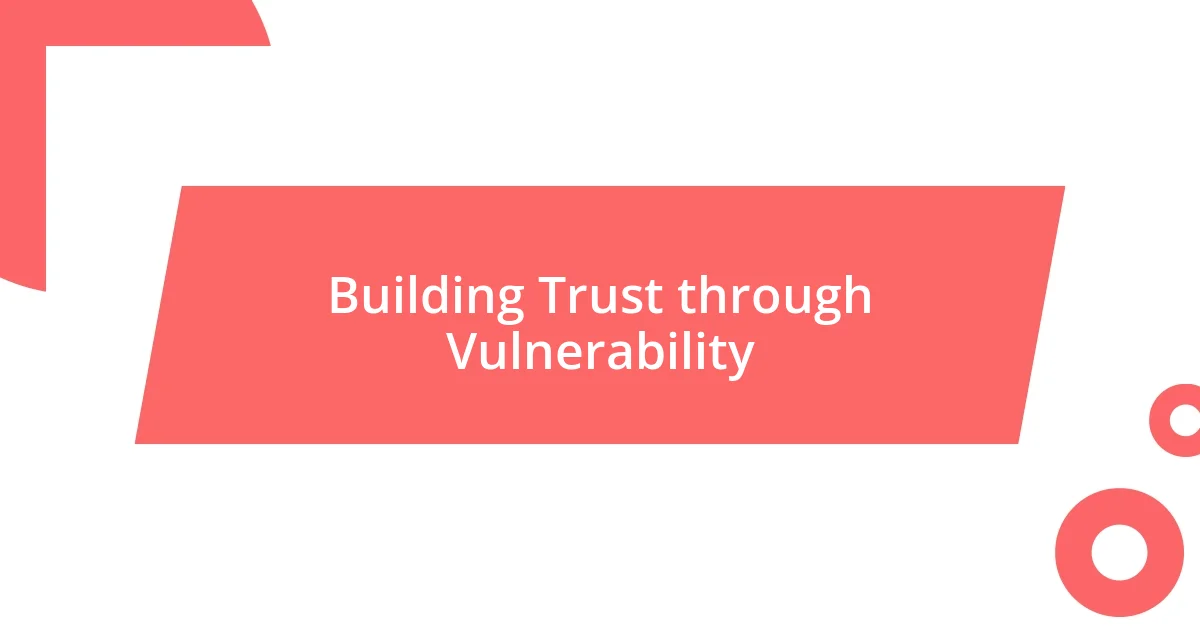
Building Trust through Vulnerability
When I think about how vulnerability builds trust, I remember a time I reviewed a skincare product that didn’t deliver results. I wrote candidly, “Despite my high hopes, my skin reacted unpredictably, leaving me frustrated and a bit vulnerable.” This honesty not only resonated with readers facing similar issues but also fostered a sense of community where we could openly share our struggles with skin care. Have you ever felt that connection grow simply by being honest?
Being vulnerable requires courage, but I’ve seen it pay off tremendously. Once, I shared my experience attending a yoga retreat, where I awkwardly found myself in poses far beyond my skill level. I wrote, “As I fumbled through my attempts, I realized I wasn’t alone in my fumbling—everyone else was too!” This admission opened up conversations with readers about personal growth through shared experiences, reminding us that vulnerability not only builds trust but makes us all a little more human. Can vulnerability be the key to creating deeper conversations?
Reflecting on my journey, I understand that sharing vulnerabilities in reviews allows my audience to see the real me. When I penned a piece about my battles with imposter syndrome while attempting a creative project, I mused, “I often felt like a fraud, questioning if I belonged in that space.” This moment of raw honesty not only resonated with many but also invited readers to share their own stories of self-doubt. In what ways do you feel vulnerability can strengthen your connection with others?












